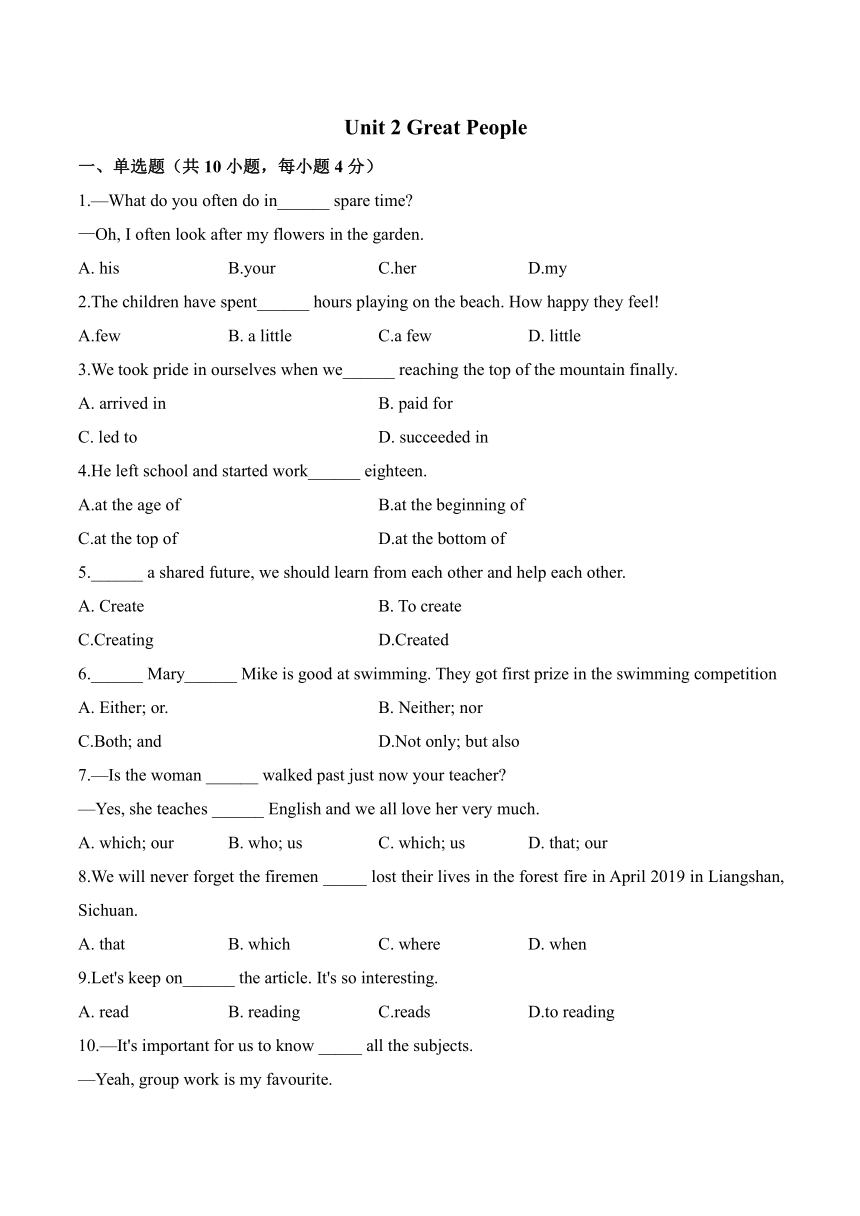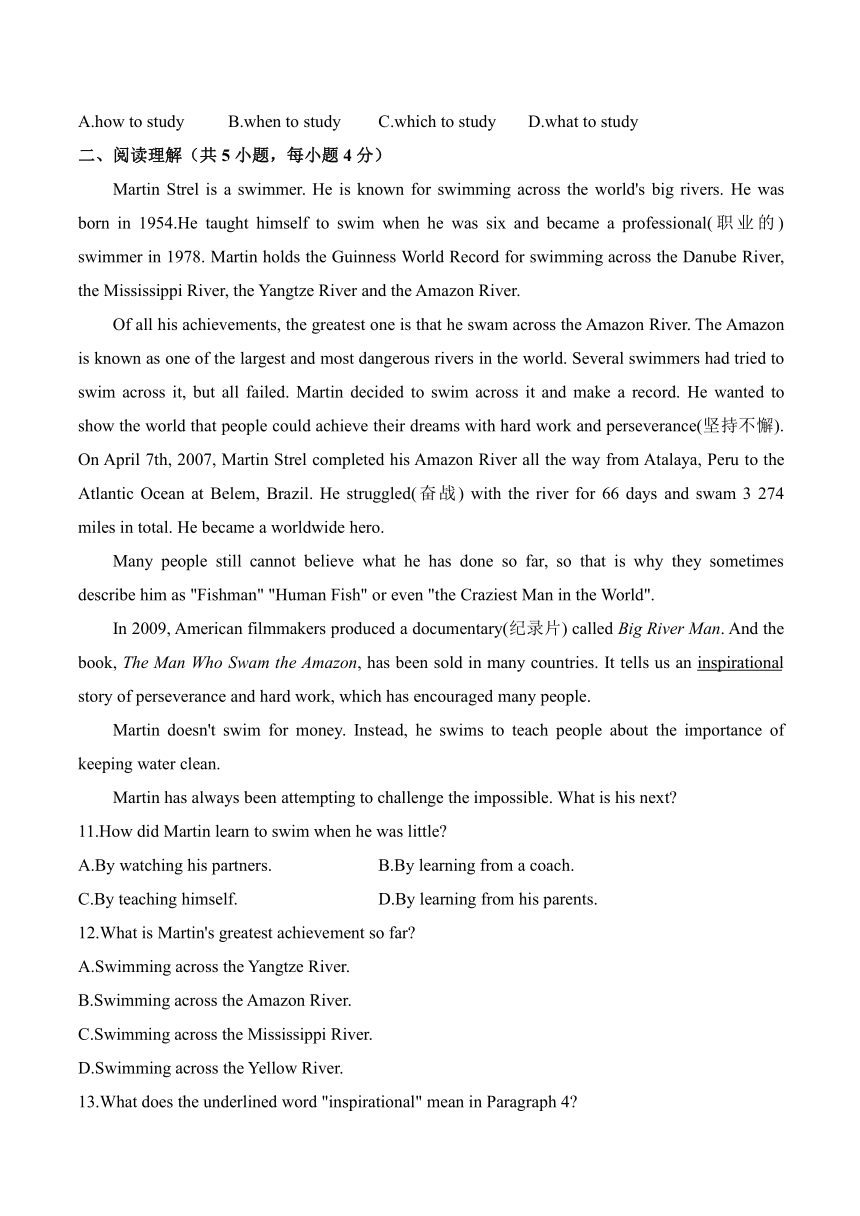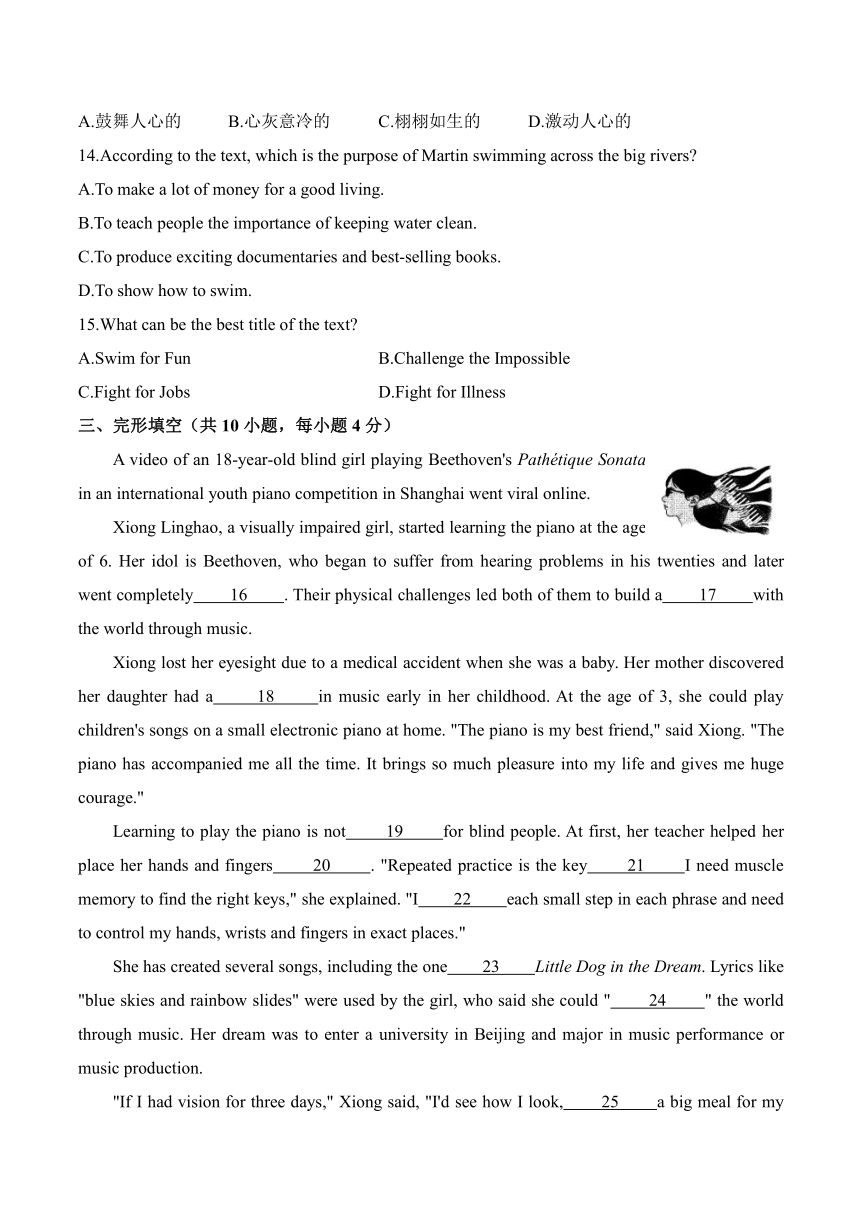Unit 2 Great People 冀教版九年级全册英语单元质检卷(B卷)(含解析)
文档属性
| 名称 | Unit 2 Great People 冀教版九年级全册英语单元质检卷(B卷)(含解析) |  | |
| 格式 | docx | ||
| 文件大小 | 42.2KB | ||
| 资源类型 | 教案 | ||
| 版本资源 | 冀教版 | ||
| 科目 | 英语 | ||
| 更新时间 | 2024-09-05 14:37:44 | ||
图片预览



文档简介
Unit 2 Great People
一、单选题(共10小题,每小题4分)
1.—What do you often do in______ spare time
—Oh, I often look after my flowers in the garden.
A. his B.your C.her D.my
2.The children have spent______ hours playing on the beach. How happy they feel!
A.few B. a little C.a few D. little
3.We took pride in ourselves when we______ reaching the top of the mountain finally.
A. arrived in B. paid for
C. led to D. succeeded in
4.He left school and started work______ eighteen.
A.at the age of B.at the beginning of
C.at the top of D.at the bottom of
5.______ a shared future, we should learn from each other and help each other.
A. Create B. To create
C.Creating D.Created
6.______ Mary______ Mike is good at swimming. They got first prize in the swimming competition
A. Either; or. B. Neither; nor
C.Both; and D.Not only; but also
7.—Is the woman ______ walked past just now your teacher
—Yes, she teaches ______ English and we all love her very much.
A. which; our B. who; us C. which; us D. that; our
8.We will never forget the firemen _____ lost their lives in the forest fire in April 2019 in Liangshan, Sichuan.
A. that B. which C. where D. when
9.Let's keep on______ the article. It's so interesting.
A. read B. reading C.reads D.to reading
10.—It's important for us to know _____ all the subjects.
—Yeah, group work is my favourite.
A.how to study B.when to study C.which to study D.what to study
二、阅读理解(共5小题,每小题4分)
Martin Strel is a swimmer. He is known for swimming across the world's big rivers. He was born in 1954.He taught himself to swim when he was six and became a professional(职业的) swimmer in 1978. Martin holds the Guinness World Record for swimming across the Danube River, the Mississippi River, the Yangtze River and the Amazon River.
Of all his achievements, the greatest one is that he swam across the Amazon River. The Amazon is known as one of the largest and most dangerous rivers in the world. Several swimmers had tried to swim across it, but all failed. Martin decided to swim across it and make a record. He wanted to show the world that people could achieve their dreams with hard work and perseverance(坚持不懈). On April 7th, 2007, Martin Strel completed his Amazon River all the way from Atalaya, Peru to the Atlantic Ocean at Belem, Brazil. He struggled(奋战) with the river for 66 days and swam 3 274 miles in total. He became a worldwide hero.
Many people still cannot believe what he has done so far, so that is why they sometimes describe him as "Fishman" "Human Fish" or even "the Craziest Man in the World".
In 2009, American filmmakers produced a documentary(纪录片) called Big River Man. And the book, The Man Who Swam the Amazon, has been sold in many countries. It tells us an inspirational story of perseverance and hard work, which has encouraged many people.
Martin doesn't swim for money. Instead, he swims to teach people about the importance of keeping water clean.
Martin has always been attempting to challenge the impossible. What is his next
11.How did Martin learn to swim when he was little
A.By watching his partners. B.By learning from a coach.
C.By teaching himself. D.By learning from his parents.
12.What is Martin's greatest achievement so far
A.Swimming across the Yangtze River.
B.Swimming across the Amazon River.
C.Swimming across the Mississippi River.
D.Swimming across the Yellow River.
13.What does the underlined word "inspirational" mean in Paragraph 4
A.鼓舞人心的 B.心灰意冷的 C.栩栩如生的 D.激动人心的
14.According to the text, which is the purpose of Martin swimming across the big rivers
A.To make a lot of money for a good living.
B.To teach people the importance of keeping water clean.
C.To produce exciting documentaries and best-selling books.
D.To show how to swim.
15.What can be the best title of the text
A.Swim for Fun B.Challenge the Impossible
C.Fight for Jobs D.Fight for Illness
三、完形填空(共10小题,每小题4分)
A video of an 18-year-old blind girl playing Beethoven's Pathétique Sonata in an international youth piano competition in Shanghai went viral online.
Xiong Linghao, a visually impaired girl, started learning the piano at the age of 6. Her idol is Beethoven, who began to suffer from hearing problems in his twenties and later went completely 16 . Their physical challenges led both of them to build a 17 with the world through music.
Xiong lost her eyesight due to a medical accident when she was a baby. Her mother discovered her daughter had a 18 in music early in her childhood. At the age of 3, she could play children's songs on a small electronic piano at home. "The piano is my best friend," said Xiong. "The piano has accompanied me all the time. It brings so much pleasure into my life and gives me huge courage."
Learning to play the piano is not 19 for blind people. At first, her teacher helped her place her hands and fingers 20 . "Repeated practice is the key 21 I need muscle memory to find the right keys," she explained. "I 22 each small step in each phrase and need to control my hands, wrists and fingers in exact places."
She has created several songs, including the one 23 Little Dog in the Dream. Lyrics like "blue skies and rainbow slides" were used by the girl, who said she could " 24 " the world through music. Her dream was to enter a university in Beijing and major in music performance or music production.
"If I had vision for three days," Xiong said, "I'd see how I look, 25 a big meal for my parents and take a walk in the places I've been to hundreds of times. Also, I'd like to see with my eyes what the piano that has accompanied me for more than ten years looks like," she said.
16.A. deaf B.red C. blind D. perfect
17.A. website B.connection C.examination D.company
18.A. hobby B. service C. Talent D. performance
19.A. difficult B. lucky C. safe D.easy
20.A. truly B.properly C.politely D.quickly
21.A. unless B. because C. though D. while
22.A. keep up with B. get along with C. look forward to D.pay attention to
23.A. pointed B. caught C.called D. thrown
24.A.see B.hear C.touch D. smell
25.A.cook B.eat C.lay D. order
答案以及解析
一、单选题
1.答案:B
解析:短语in one's spare time意为“在某人的空闲时间”,根据问句中的you和答语中的I可知选B 项。
3.答案:C
解析:句意为:孩子们在沙滩上已经玩了几个小时。他们多么开心啊!a little 和little 修饰不可数名词,排除B、D项。few意为“几乎没有”;a few意为“一些”。结合语境,此处表示肯定,故选C项。
3.答案:D
解析:句意为:当我们最终成功到达山顶时,我们为自己感到骄傲。arrive in意为“到达”;pay for 意为“为……付款”;lead to 意为“导致”;succeed in doing sth 意为“成功做某事”。根据语境,故选D项。
4.答案:A
解析:句意为:他在18岁时离开了学校并开始工作。at the age of 意为“在……岁时”,符合语境。故选A项。
5.答案:B
解析:句意为:为了创造一个共享未来,我们应该向彼此学习并帮助彼此。此处应用动词不定式结构作目的状语。故选B项。
6.答案:D
解析:根据"They got first prize in the swimming competition."可知玛丽和麦克都擅长游泳。此句中系动词是is,则只能用not only... but also...结构。故选D项。
7.答案:B
解析:第一空定语从句,引导词指人作主语,用who, teach后接宾语,故用宾格形式,故选:B。
8.答案:A
解析:句意:我们将永远都不会忘记在2019年4月四川凉山州森林火灾中牺牲的消防队员。理解句意并分析句子结构知,本句是含有定语从句的主从复合句,其中先行词firemen指人,关系代词在定语从句中作主语,应用关系代词who或that引导定语从句。故选A。
9.答案:B
解析:短语keep on doing sth意为“继续做某事”,故选B项。
10.答案:A
解析:根据group work is my favourite 可知此处说的是学习的方式,故应用“how +动词不定式”结构作know的宾语。故选A项。
二、阅读理解
11.答案:C
解析:细节理解题。由第一段中的“He taught himself to swim when he was six...”可知,他是自学游泳的。故选C项。
12.答案:B
解析:细节理解题。由第二段中的“Of all his achievements, the greatest one is that he swam across the Amazon River.”可知,他目前最大的成就就是横渡亚马孙河。故选B项。
13.答案:A
解析:词义猜测题。根据 which has encouraged many people 可推断 inspirational 意为“鼓舞人心的”。故选A项。
14.答案:B
解析:细节理解题。根据第五段中的“Instead, he swims to teach people about the importance of keeping water clean.”可知,他游泳是为了告诉人们保持水干净的重要性。故选B项。
15.答案:B
解析:主旨大意题。根据最后一段中的“Martin has always been attempting to challenge the impossible.”可知,他一直在尝试挑战不可能的事。故选B项。
三、完形填空
16.答案: A
解析:由"Her idol is Beethoven, who began to suffer from hearing problems in his twenties..."及常识可知,贝多芬20多岁时开始出现听力问题,之后听力完全丧失。
17.答案:B
解析:website意为“网站”;connection意为“联系”;examination意为“考试”;company意为“公司”。根据上下文可知,贝多芬和熊翎好都通过音乐与世界建立了联系。
18.答案:C
解析:hobby意为“业余爱好”;service意为“服务”;talent 意为“才华;天赋”;performance意为“表演”。由"At the age of 3, she could play children's songs on a small electronic piano at home."可知,熊翎好的妈妈发现女儿有音乐天赋。故选C项。
19.答案:D
解析:difficult 意为“困难的”;lucky意为“幸运的”;safe意为“安全的”;easy意为“容易的”。由后面的for blind people可知,盲人学习弹钢琴是不容易的。故选D项。
20.答案:B
解析:句意为:起初,她的老师帮助她正确放置手和手指。truly意为“真正地”;properly意为“正确地”;politely意为“有礼貌地”;quickly意为“迅速地”。根据语境,故选B项。
21.答案:B
解析:后面的I need muscle memory to find the right keys是练习的原因,所以应用because引导原因状语从句。故选B项。
22.答案:D
解析:keep up with意为“跟上;赶上”;get along with 意为“与……(和睦)相处”;look forward to 意为“盼望”;pay attention to 意为“注意”。根据语境,此处表示她很注意每个乐句中的每一个小节拍。
23.答案:C
解析:point意为“指着”;catch意为“抓住”;call意为“叫作”;throw意为“扔”。后面的Little Dog in the Dream是一首曲子的名字,故此处表示“叫作”。故选C项。
24.答案:A
解析:see意为“看到”;hear意为“听到”;touch意为“触摸”;smell意为“闻到”。由上文可知,熊翎好是个盲人,所以她可以通过音乐“看到”世界。故选A项。
25.答案:A
解析:cook意为“烹饪”;eat意为“吃”;lay意为“摆放”;order意为“预订”。由后面的a big meal for my parents并结合语境可知,此处表示为父母做一顿大餐。故选A项。
一、单选题(共10小题,每小题4分)
1.—What do you often do in______ spare time
—Oh, I often look after my flowers in the garden.
A. his B.your C.her D.my
2.The children have spent______ hours playing on the beach. How happy they feel!
A.few B. a little C.a few D. little
3.We took pride in ourselves when we______ reaching the top of the mountain finally.
A. arrived in B. paid for
C. led to D. succeeded in
4.He left school and started work______ eighteen.
A.at the age of B.at the beginning of
C.at the top of D.at the bottom of
5.______ a shared future, we should learn from each other and help each other.
A. Create B. To create
C.Creating D.Created
6.______ Mary______ Mike is good at swimming. They got first prize in the swimming competition
A. Either; or. B. Neither; nor
C.Both; and D.Not only; but also
7.—Is the woman ______ walked past just now your teacher
—Yes, she teaches ______ English and we all love her very much.
A. which; our B. who; us C. which; us D. that; our
8.We will never forget the firemen _____ lost their lives in the forest fire in April 2019 in Liangshan, Sichuan.
A. that B. which C. where D. when
9.Let's keep on______ the article. It's so interesting.
A. read B. reading C.reads D.to reading
10.—It's important for us to know _____ all the subjects.
—Yeah, group work is my favourite.
A.how to study B.when to study C.which to study D.what to study
二、阅读理解(共5小题,每小题4分)
Martin Strel is a swimmer. He is known for swimming across the world's big rivers. He was born in 1954.He taught himself to swim when he was six and became a professional(职业的) swimmer in 1978. Martin holds the Guinness World Record for swimming across the Danube River, the Mississippi River, the Yangtze River and the Amazon River.
Of all his achievements, the greatest one is that he swam across the Amazon River. The Amazon is known as one of the largest and most dangerous rivers in the world. Several swimmers had tried to swim across it, but all failed. Martin decided to swim across it and make a record. He wanted to show the world that people could achieve their dreams with hard work and perseverance(坚持不懈). On April 7th, 2007, Martin Strel completed his Amazon River all the way from Atalaya, Peru to the Atlantic Ocean at Belem, Brazil. He struggled(奋战) with the river for 66 days and swam 3 274 miles in total. He became a worldwide hero.
Many people still cannot believe what he has done so far, so that is why they sometimes describe him as "Fishman" "Human Fish" or even "the Craziest Man in the World".
In 2009, American filmmakers produced a documentary(纪录片) called Big River Man. And the book, The Man Who Swam the Amazon, has been sold in many countries. It tells us an inspirational story of perseverance and hard work, which has encouraged many people.
Martin doesn't swim for money. Instead, he swims to teach people about the importance of keeping water clean.
Martin has always been attempting to challenge the impossible. What is his next
11.How did Martin learn to swim when he was little
A.By watching his partners. B.By learning from a coach.
C.By teaching himself. D.By learning from his parents.
12.What is Martin's greatest achievement so far
A.Swimming across the Yangtze River.
B.Swimming across the Amazon River.
C.Swimming across the Mississippi River.
D.Swimming across the Yellow River.
13.What does the underlined word "inspirational" mean in Paragraph 4
A.鼓舞人心的 B.心灰意冷的 C.栩栩如生的 D.激动人心的
14.According to the text, which is the purpose of Martin swimming across the big rivers
A.To make a lot of money for a good living.
B.To teach people the importance of keeping water clean.
C.To produce exciting documentaries and best-selling books.
D.To show how to swim.
15.What can be the best title of the text
A.Swim for Fun B.Challenge the Impossible
C.Fight for Jobs D.Fight for Illness
三、完形填空(共10小题,每小题4分)
A video of an 18-year-old blind girl playing Beethoven's Pathétique Sonata in an international youth piano competition in Shanghai went viral online.
Xiong Linghao, a visually impaired girl, started learning the piano at the age of 6. Her idol is Beethoven, who began to suffer from hearing problems in his twenties and later went completely 16 . Their physical challenges led both of them to build a 17 with the world through music.
Xiong lost her eyesight due to a medical accident when she was a baby. Her mother discovered her daughter had a 18 in music early in her childhood. At the age of 3, she could play children's songs on a small electronic piano at home. "The piano is my best friend," said Xiong. "The piano has accompanied me all the time. It brings so much pleasure into my life and gives me huge courage."
Learning to play the piano is not 19 for blind people. At first, her teacher helped her place her hands and fingers 20 . "Repeated practice is the key 21 I need muscle memory to find the right keys," she explained. "I 22 each small step in each phrase and need to control my hands, wrists and fingers in exact places."
She has created several songs, including the one 23 Little Dog in the Dream. Lyrics like "blue skies and rainbow slides" were used by the girl, who said she could " 24 " the world through music. Her dream was to enter a university in Beijing and major in music performance or music production.
"If I had vision for three days," Xiong said, "I'd see how I look, 25 a big meal for my parents and take a walk in the places I've been to hundreds of times. Also, I'd like to see with my eyes what the piano that has accompanied me for more than ten years looks like," she said.
16.A. deaf B.red C. blind D. perfect
17.A. website B.connection C.examination D.company
18.A. hobby B. service C. Talent D. performance
19.A. difficult B. lucky C. safe D.easy
20.A. truly B.properly C.politely D.quickly
21.A. unless B. because C. though D. while
22.A. keep up with B. get along with C. look forward to D.pay attention to
23.A. pointed B. caught C.called D. thrown
24.A.see B.hear C.touch D. smell
25.A.cook B.eat C.lay D. order
答案以及解析
一、单选题
1.答案:B
解析:短语in one's spare time意为“在某人的空闲时间”,根据问句中的you和答语中的I可知选B 项。
3.答案:C
解析:句意为:孩子们在沙滩上已经玩了几个小时。他们多么开心啊!a little 和little 修饰不可数名词,排除B、D项。few意为“几乎没有”;a few意为“一些”。结合语境,此处表示肯定,故选C项。
3.答案:D
解析:句意为:当我们最终成功到达山顶时,我们为自己感到骄傲。arrive in意为“到达”;pay for 意为“为……付款”;lead to 意为“导致”;succeed in doing sth 意为“成功做某事”。根据语境,故选D项。
4.答案:A
解析:句意为:他在18岁时离开了学校并开始工作。at the age of 意为“在……岁时”,符合语境。故选A项。
5.答案:B
解析:句意为:为了创造一个共享未来,我们应该向彼此学习并帮助彼此。此处应用动词不定式结构作目的状语。故选B项。
6.答案:D
解析:根据"They got first prize in the swimming competition."可知玛丽和麦克都擅长游泳。此句中系动词是is,则只能用not only... but also...结构。故选D项。
7.答案:B
解析:第一空定语从句,引导词指人作主语,用who, teach后接宾语,故用宾格形式,故选:B。
8.答案:A
解析:句意:我们将永远都不会忘记在2019年4月四川凉山州森林火灾中牺牲的消防队员。理解句意并分析句子结构知,本句是含有定语从句的主从复合句,其中先行词firemen指人,关系代词在定语从句中作主语,应用关系代词who或that引导定语从句。故选A。
9.答案:B
解析:短语keep on doing sth意为“继续做某事”,故选B项。
10.答案:A
解析:根据group work is my favourite 可知此处说的是学习的方式,故应用“how +动词不定式”结构作know的宾语。故选A项。
二、阅读理解
11.答案:C
解析:细节理解题。由第一段中的“He taught himself to swim when he was six...”可知,他是自学游泳的。故选C项。
12.答案:B
解析:细节理解题。由第二段中的“Of all his achievements, the greatest one is that he swam across the Amazon River.”可知,他目前最大的成就就是横渡亚马孙河。故选B项。
13.答案:A
解析:词义猜测题。根据 which has encouraged many people 可推断 inspirational 意为“鼓舞人心的”。故选A项。
14.答案:B
解析:细节理解题。根据第五段中的“Instead, he swims to teach people about the importance of keeping water clean.”可知,他游泳是为了告诉人们保持水干净的重要性。故选B项。
15.答案:B
解析:主旨大意题。根据最后一段中的“Martin has always been attempting to challenge the impossible.”可知,他一直在尝试挑战不可能的事。故选B项。
三、完形填空
16.答案: A
解析:由"Her idol is Beethoven, who began to suffer from hearing problems in his twenties..."及常识可知,贝多芬20多岁时开始出现听力问题,之后听力完全丧失。
17.答案:B
解析:website意为“网站”;connection意为“联系”;examination意为“考试”;company意为“公司”。根据上下文可知,贝多芬和熊翎好都通过音乐与世界建立了联系。
18.答案:C
解析:hobby意为“业余爱好”;service意为“服务”;talent 意为“才华;天赋”;performance意为“表演”。由"At the age of 3, she could play children's songs on a small electronic piano at home."可知,熊翎好的妈妈发现女儿有音乐天赋。故选C项。
19.答案:D
解析:difficult 意为“困难的”;lucky意为“幸运的”;safe意为“安全的”;easy意为“容易的”。由后面的for blind people可知,盲人学习弹钢琴是不容易的。故选D项。
20.答案:B
解析:句意为:起初,她的老师帮助她正确放置手和手指。truly意为“真正地”;properly意为“正确地”;politely意为“有礼貌地”;quickly意为“迅速地”。根据语境,故选B项。
21.答案:B
解析:后面的I need muscle memory to find the right keys是练习的原因,所以应用because引导原因状语从句。故选B项。
22.答案:D
解析:keep up with意为“跟上;赶上”;get along with 意为“与……(和睦)相处”;look forward to 意为“盼望”;pay attention to 意为“注意”。根据语境,此处表示她很注意每个乐句中的每一个小节拍。
23.答案:C
解析:point意为“指着”;catch意为“抓住”;call意为“叫作”;throw意为“扔”。后面的Little Dog in the Dream是一首曲子的名字,故此处表示“叫作”。故选C项。
24.答案:A
解析:see意为“看到”;hear意为“听到”;touch意为“触摸”;smell意为“闻到”。由上文可知,熊翎好是个盲人,所以她可以通过音乐“看到”世界。故选A项。
25.答案:A
解析:cook意为“烹饪”;eat意为“吃”;lay意为“摆放”;order意为“预订”。由后面的a big meal for my parents并结合语境可知,此处表示为父母做一顿大餐。故选A项。
同课章节目录
- Unit 1 Stay Healthy
- Lesson 1 What's Wrong,Danny?
- Lesson 2 A Visit to the Dentist
- Lesson 3 Good Food, Good Health
- Lesson 4 Don't Smoke, Please!
- Lesson 5 Jane's Lucky Life
- Lesson 6 Stay Away from the Hospital
- Unit Review
- Unit 2 Great People
- Lesson 7 What Is the Meaning of Lift?
- Lesson 8 A Universe of Thought
- Lesson 9 China's Most Famous "Farmer"
- Lesson 10 Touch the World
- Lesson 11 To China, with Love
- Lesson 12 Guess My Hero!
- Unit Review
- Unit 3 Safety
- Lesson 13 Be Careful,Danny!
- Lesson 14 Accidents Happen
- Lesson 15 My Helmet Saved My Life!
- Lesson 16 How Safe Is Your Home?
- Lesson 17 Staying Safe in an Earthquake
- Lesson 18 Never Catch a Dinosaur
- Unit Review
- Unit 4 Stories and poems
- Lesson 19 A Story or a Poem?
- Lesson 20 Say It in Five
- Lesson 21 The Fable of the Woodcutte
- Lesson 22 The Giant(Ⅰ)
- Lesson 23 The Giant(Ⅱ)
- Lesson 24 Writing a Poem
- Unit Review
- Unit 5 Look into Science
- Lesson 25 Let's Do an Experiment!
- Lesson 26 Keep the Candle Burning
- Lesson 27 Planet Danny
- Lesson 28 The Study of Living Things
- Lesson 29 DNA—The Story of You
- Lesson 30 Science Affects Us
- Unit Review
- Unit 6 Movies and Theate
- Lesson 31 A movie or a Play
- Lesson 32 Moving Pictures
- Lesson 33 The Fisherman and the Goldfish(Ⅰ)
- Lesson 34 The Fisherman and the Goldfish(Ⅱ)
- Lesson 35 Theatres Are Fun!
- Lesson 36 Making Plays Is Fun
- Unit Review
